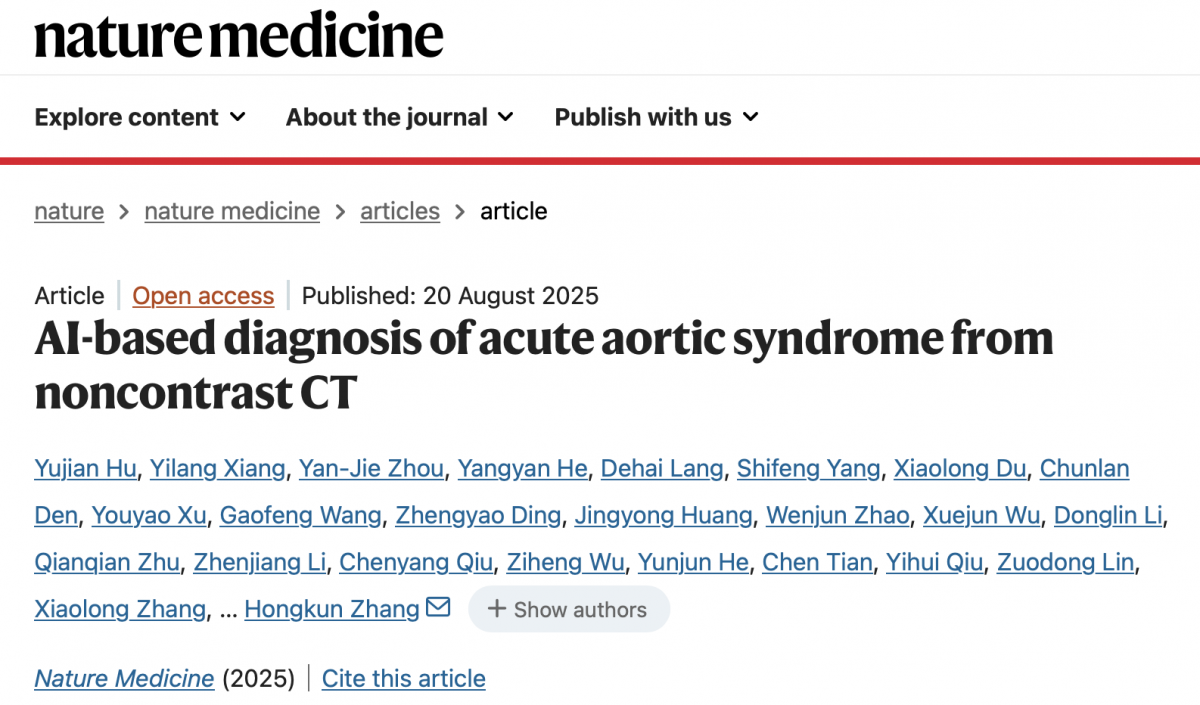Acute Aortic Syndrome (AAS) is a life-threatening cardiovascular condition that often presents with subtle onset and rapid progression, making diagnosis promptly a major clinical challenge. Fail to be diagnosed and treated within 24 hours, the mortality rate of AAS can reach as high as 30%.
To address this challenge, Alibaba DAMO Academy (“DAMO”) teams up with The First Affiliated Hospital, Zhejiang University School of Medicine to jointly launch iAorta — an AI model designed for identifying emergency chest pain — that can detect AAS within seconds using routine non-contrast CT scans, reducing the overall time to diagnosis within two hours. The model has already accurately identified 21 atypical cases among more than 10,000 chest pain patients, enabling them to receive timely treatment. iAorta has now been deployed in 10 pilot hospitals across Zhejiang Province in China, with plans to expand to more hospitals nationwide in the near future.

Researchers have spent the past three years in developing iAorta by employing DAMO’s years of expertise in using AI for non-contrast CT scans. iAorta can outline the aorta and its lumen within seconds and detect structural changes in the vessel wall to accurately identify AAS.
The AI model has also significantly reduced the time required for diagnosis, helping patients gain access to critical treatment in a timely manner. The average time from hospital admission to diagnosis for the identified 21 atypical patients was only 1.7 hours, far shorter than the median diagnosis time of 4.3 hours in some markets.
Dr. Zhang Hongkun, Director of the Vascular Surgery Department at The First Affiliated Hospital, Zhejiang University School of Medicine, stated: “We are thrilled to work with Alibaba to promote this AI technology, as it can greatly benefit hospitals where medical resources and physician expertise are relatively limited. Our goal is to improve the overall diagnostic and treatment capabilities for aortic diseases across all healthcare institutions.”
DAMO has been actively advancing medical AI, using a single non-contrast CT scan to identify multiple conditions that are traditionally difficult to detect. This technology has been applied in detecting cancers such as pancreatic, gastric, esophageal, colorectal, and liver cancer; chronic diseases including osteoporosis and fatty liver; and acute conditions like AAS.
In July, DAMO’s contributions to medical AI have been recognized in the United Nations’ AI for Good Innovate for Impact Interim Report 2025. DAMO has also partnered with the United Nations International Telecommunication Union (ITU) to leverage artificial intelligence for addressing critical global challenges, including healthcare, climate change, and scientific research.


This sort of stuff really illustrates the potential for this tech when it’s being integrated into a sane society.